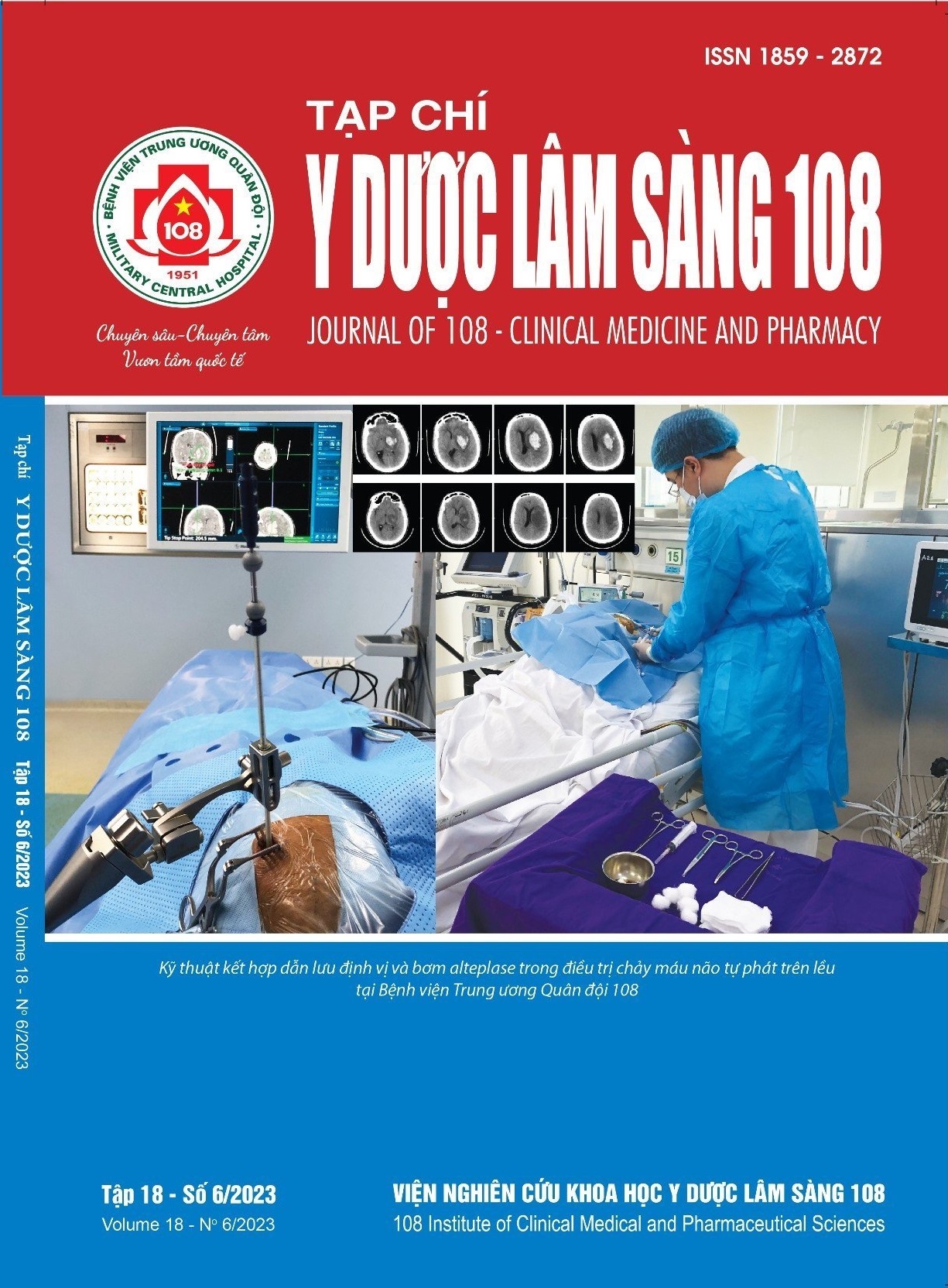The results of liver resection with intraoperative ultrasound for hepatocellular carcinoma
Main Article Content
Keywords
Abstract
Objective: To evaluate the results of liver resection with intraoperative ultrasound for hepatocellular carcinoma. Subject and method: A prospective observational study enrolled 91 patients underwent liver resection for hepatocellular carcinoma with intraoperative ultrasound at 108 Military Central Hospital. Result: There were 80 males, and 11 females patients with average age of 51.6 ± 11.7. The chronic HBV infection rate was 71%, AFP level more than 400ng/ml found in 33 patients (33.4%). Major hepatectomy rate was 30.8%, minor hepatectomy rate was 69.2%. Intraoperative ultrasound detected new tumors in 12% cases and changed the operative plans in 11% of cases. Average operation time: 169.5 ± 98 minutes, average blood loss: 240.6 ± 196ml, with 03 cases required intraoperative blood transfusion. There was no mortality, and 15.4% morbidities, in which, majority were pleural effusion. Median of hospital stay was 10 days. Conclusion: Intraoperative ultrasound is simple and feasible. The liver resection operation with intraoperative ultrasound helps the surgeon to determine correct stage and operate radically
Article Details
References
2. Nguyễn Cao Cương (2003) Siêu âm lúc mổ trong phẫu thuật cắt gan điều trị ung thư gan. Tạp chí Y học thành phố Hồ Chí Minh; 7(1), tr. 21-25.
3. Lê Văn Thành, Nguyễn Cường Thịnh, Lương Công Chánh (2012) Kết quả 96 trường hợp cắt gan kết hợp phương pháp Tôn Thất Tùng và Lortat - Jacob điều trị ung thư biểu mô tế bào gan. Ngoại khoa, số đặc biệt, tr. 43-48.
4. Bismuth HCD, Kunstingler F (1984) Operative ultrasound of the liver and biliary ducts. Springer-Verlag, New York, NY.
5. Makuuchi M, Hasegawa H, Yamazaki S (1985) Ultrasonically guided subsegmentectomy. Surgery, gynecology & obstetrics 161(4): 346-350.
6. Torzilli G, Montorsi M, Del Fabbro D, Palmisano A, Donadon M, Makuuchi M (2006) Ultrasonographically guided surgical approach to liver tumours involving the hepatic veins close to the caval confluence. The British journal of surgery 93(10): 1238-1246.
7. Sotiropoulos GC, Lang H, Frilling A, Molmenti EP, Paul A, Nadalin S, Radtke A, Brokalaki EI, Saner F, Hilgard P, Gerken G, Broelsch CE, Malagò M (2006) Resectability of hepatocellular carcinoma: Evaluation of 333 consecutive cases at a single hepatobiliary specialty center and systematic review of the literature. Hepatogastroenterology 53: 322-329.
8. Jarnagin WR, Bach AM, Winston CB, Hann LE, Heffernan N, Loumeau T et al (2001) What is the yield of intraoperative ultrasonography during partial hepatectomy for malignant disease? Journal of the American College of Surgeons 192(5): 577-583.
9. Cerwenka H, Raith J, Bacher H, Werkgartner G el-Shabrawi A, Kornprat P et al (2003) Is intraoperative ultrasonography during partial hepatectomy still necessary in the age of magnetic resonance imaging? Hepato-gastroenterology 50(53): 1539-1541.
 ISSN: 1859 - 2872
ISSN: 1859 - 2872
